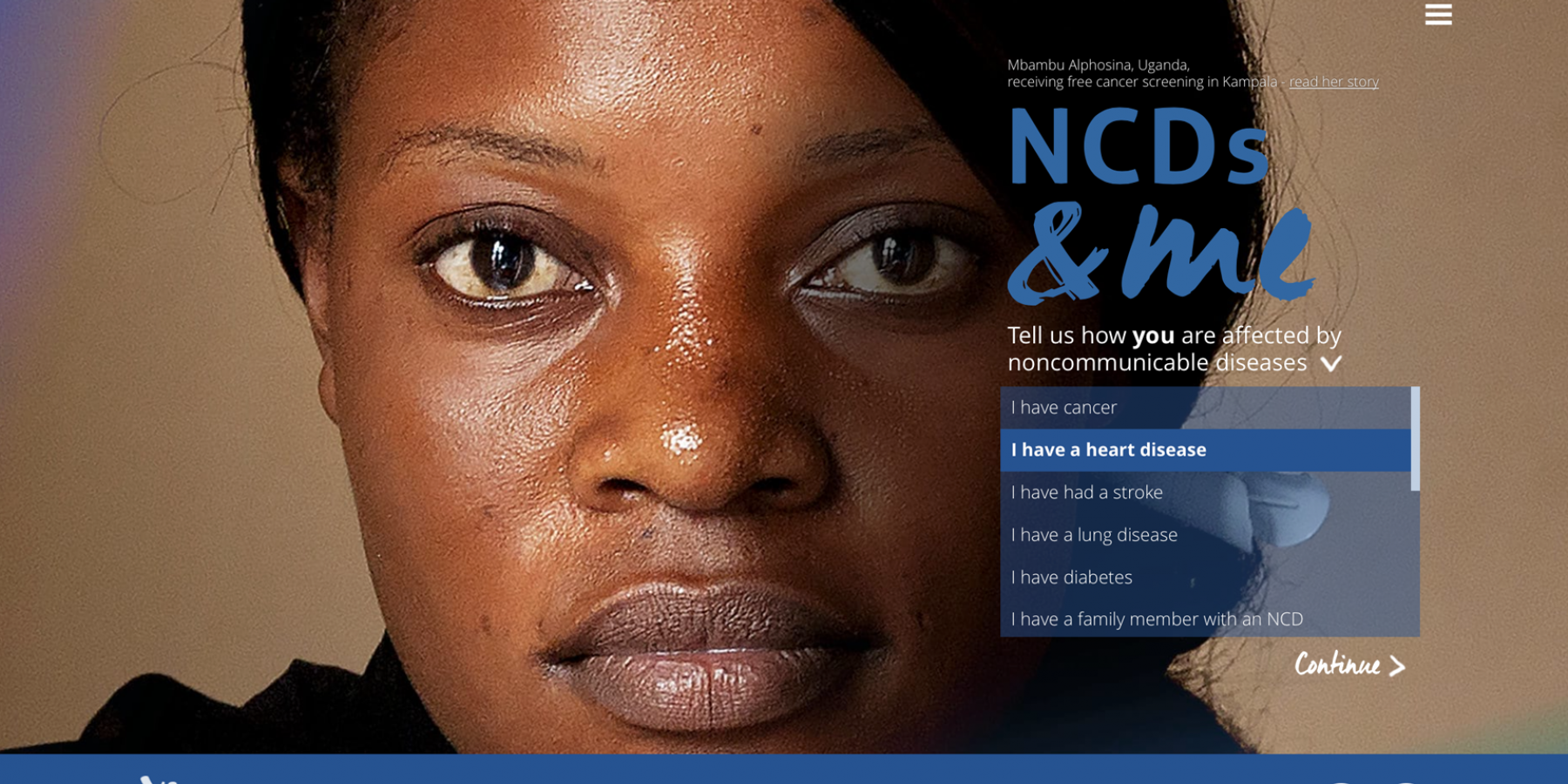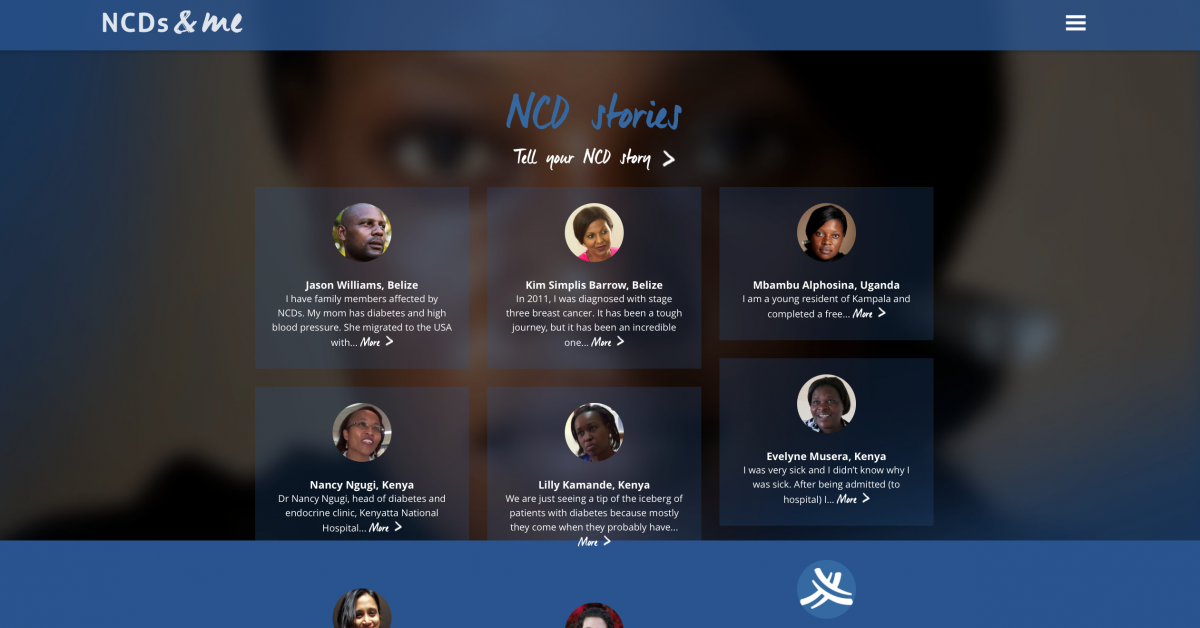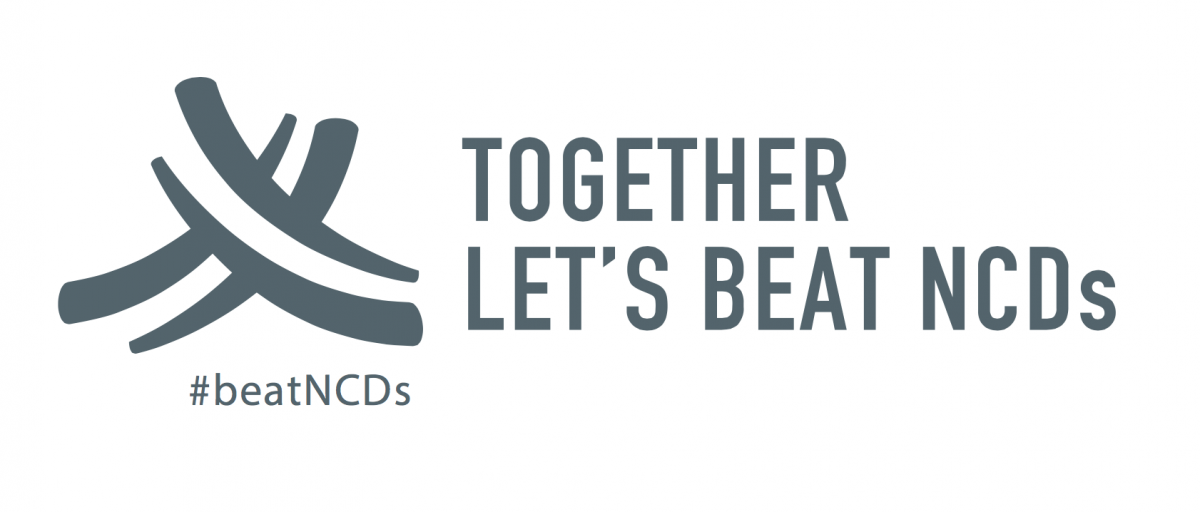Telling stories, taking action: WHO's new global communications campaign on NCDs
18th August 2016

18th August 2016
“No one knows what ‘NCDs’ stands for.”
“The term ‘NCDs’ is meaningless.”
“We need to come up with a better name for NCDs.”
Statements like these remind us that despite the devastating consequences NCDs and their risk factors have on countries and communities alike, few people outside the halls of health policy making are familiar with the term.
But what’s lost in debates over acronyms is the fact that everyone has a story – a young man with asthma made worse by the city air. A woman forced to leave her job in order to care for a parent with dementia. An adolescent confronted by advertisements for unhealthy foods and alcohol on their way to school each day.
These stories matter.
They remind us that when we put terminology and technical jargon aside, we are really talking about people – individuals whose wellbeing depends on our ability to raise the level of awareness, ambition, and action taken to prevent and control NCDs.
WHO’s newly-launched global communications campaign on NCDs rests on the idea that by combining the stories and pictures of people affected by NCDs with information and tools that cut across all areas of NCD prevention and control, we can meet the nine global NCD targets and reduce premature deaths by the 2025 deadline. By meeting these targets and reducing deaths, we will move toward realising our ultimate goal: fulfilling the commitments in the 2030 Agenda for Sustainable Development, including SDG target 3.4 on NCDs.
One of the main elements of this campaign is an innovative new web-based platform entitled “NCDs&me.” This user-friendly site is designed to allow people to share how they have been affected by NCDs, in their own words. Stories are placed in a broader context, reminding people that they are not alone in their quest to protect and promote their health and the health of those around them. Links provide easy access to facts about NCDs, and information on how governments and WHO are addressing NCDs.
From these stories emerges a clear sense of the human impact of NCDs, and with that, a shared responsibility to promote and support the work of national governments to prevent and control these diseases and risk factors. By demonstrating that NCDs affect all of us, the stories will also reduce the stigma and marginalisation that burden many people living with NCDs.
If you have not yet already done so, I encourage you to take five minutes to share your story and read those posted by other people here.

Telling stories alone is not enough if we wish to see lives improved and deaths averted – we must also take action. Countries have committed to lead the way by setting policies to prevent exposure to NCD risk factors, effectively treat the diseases while preventing the financial hardships linked to seeking care, and to create healthy environments. Fortunately, policy guidance and cost-effective tools are available to provide exactly how to do this.
A new WHO webpage acts as a one-stop shop for accessing this suite of technical and political guidance. Developed as part of this campaign, this page is a portal through which governments and stakeholders alike can find facts on the global NCD burden, find out how to take action to beat NCDs, and access supporting campaign tools like policy briefs and posters.
A noteworthy feature of this site is the ability for visitors to quickly and easily check country progress on NCDs. Country implementation pages provide direct access to country profiles with information on progress being made at the national level. Sri Lanka is the first such country with a profile page. In a country where NCDs account for 75 percent of total deaths, Sri Lanka has affirmed its commitment to reduce the harmful use of alcohol, curb tobacco use, improve road safety, and promote healthier lives overall. It is one of many examples of national action demonstrating that beating NCDs is feasible.

As the lead specialised agency for health in the UN system, WHO continues to provide strong technical support to governments as they move to protect the health of their people. But we cannot do it alone.
Join us as we evolve this campaign as we move toward the third UN High-level Meeting on NCDs in 2018:
What’s lost in debates over NCD & chronic disease acronyms is the fact that everyone has a story.
Dr Bente Mikkelsen (@kulmur) is Head a.i. of the Secretariat for the Global Coordination on the prevention and control of noncommunicable diseases (WHO GCM/NCD) at the World Health Organization in Geneva, Switzerland (@WHO). The GCM/NCD is tasked by WHO Member States to enhance the coordination of activities, multi-stakeholder engagement and action across sectors in order to contribute to the implementation of the WHO Global Action Plan for the Prevention and Control of NCDs 2013-2020. She is a former CEO of the Southern and Eastern Norway Regional Health Authority (70,000 employees, 8 billion USD budget. She is trained as a Gynaecologist and Obstetrician and holds a Master in Health Administration and Management degree from the University of Oslo. Her current focus is on the implementation of the Global Action Plan on NCDs in the context of the WHO reform, cross cutting measures, integration, innovation and new technologies by working across sectors beyond health and in line with the Sustainable Development Goals. To stay up to date with the WHO’s work on NCDs, follow the UN Interagency Task Force on Twitter (@un_ncd).